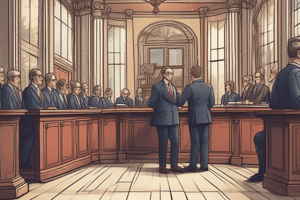Podcast
Questions and Answers
Which of the following statements is TRUE about public limited companies?
Which of the following statements is TRUE about public limited companies?
- Public limited companies are typically restricted in the transferability of shares.
- Public limited companies are required to fulfill stricter legal reporting requirements compared to other types of companies. (correct)
- Public limited companies are primarily funded through personal investments.
- Public limited companies are restricted in their fundraising options.
What is the primary reason for the connection between company law and corporate finance?
What is the primary reason for the connection between company law and corporate finance?
- Company law and corporate finance are separate areas with no significant overlap.
- Company law restricts the amount of capital companies can raise.
- Company law regulates how companies raise capital, while corporate finance deals with applying and managing that capital. (correct)
- Corporate finance is a branch of law that governs the financial activities of companies.
Which of these circumstances might lead to 'piercing the corporate veil'?
Which of these circumstances might lead to 'piercing the corporate veil'?
- A company's decision to shut down operations.
- A company's involvement in fraudulent activities. (correct)
- A company's failure to meet its profit targets.
- A company's inability to repay its debts.
Identify the primary characteristic of a company undergoing voluntary dissolution.
Identify the primary characteristic of a company undergoing voluntary dissolution.
What is the main objective of harmonizing company law across multiple jurisdictions?
What is the main objective of harmonizing company law across multiple jurisdictions?
What is the primary purpose of company law?
What is the primary purpose of company law?
Which of the following is NOT a typical right of shareholders in a company?
Which of the following is NOT a typical right of shareholders in a company?
What is the primary function of a company's memorandum of association?
What is the primary function of a company's memorandum of association?
Which of the following best describes the concept of limited liability for shareholders?
Which of the following best describes the concept of limited liability for shareholders?
What is the primary responsibility of the board of directors in a company?
What is the primary responsibility of the board of directors in a company?
What is a key principle of good corporate governance?
What is a key principle of good corporate governance?
Which of the following is NOT a factor in determining the type of company formed?
Which of the following is NOT a factor in determining the type of company formed?
How does company law balance the interests of various stakeholders?
How does company law balance the interests of various stakeholders?
Flashcards
Private Limited Companies
Private Limited Companies
Companies with restricted share transferability and fewer reporting requirements.
Public Limited Companies
Public Limited Companies
Companies that offer shares to the public through stock exchanges with stringent reporting requirements.
Company Law
Company Law
Regulations governing how companies raise capital and manage legal liabilities.
Dissolution of Companies
Dissolution of Companies
Signup and view all the flashcards
Limited Liability
Limited Liability
Signup and view all the flashcards
Separate Legal Personality
Separate Legal Personality
Signup and view all the flashcards
Articles of Association
Articles of Association
Signup and view all the flashcards
Memorandum of Association
Memorandum of Association
Signup and view all the flashcards
Shareholder Rights
Shareholder Rights
Signup and view all the flashcards
Directors' Duties
Directors' Duties
Signup and view all the flashcards
Corporate Governance
Corporate Governance
Signup and view all the flashcards
Types of Companies
Types of Companies
Signup and view all the flashcards
Study Notes
Introduction to Company Law
- Company law governs the formation, operation, and dissolution of companies.
- It outlines the rights and responsibilities of shareholders, directors, and other stakeholders.
- Different company types exist, each with specific legal requirements (e.g., private companies, public companies).
- Company law balances the interests of various stakeholders, including investors, creditors, employees, and the wider community.
Formation of Companies
- Companies form by fulfilling legal requirements in relevant legislation.
- Registration with a government agency typically occurs.
- Companies have a separate legal personality from their owners.
- This means the company, not the owners, is liable for debts.
- Articles of association detail internal rules and regulations.
- The memorandum of association outlines the company's purpose.
Shareholder Rights and Duties
- Shareholders are company owners with associated rights.
- They can vote on significant decisions.
- Shareholders vote to elect the board of directors.
- Dividend rights depend on company profits and policy.
- Shareholders can inspect company records.
- Shareholders are bound by the company's articles of association.
- Shareholders have limited liability, protecting personal assets.
- Minority shareholder rights prevent potential abuses from majority shareholders.
Directors' Duties and Responsibilities
- Directors have duties to the company and shareholders.
- Duties of care and skill require acting in good faith.
- Duty of loyalty necessitates acting in the company's best interest.
- Directors must avoid conflicts of interest.
- Directors' duties are legally enforceable.
- The board oversees company daily operations.
Corporate Governance
- Corporate governance involves company control and management systems.
- Good governance includes transparency, accountability, and fairness.
- It boosts investor confidence, strengthens reputation, and reduces risks.
Types of Companies
- Companies vary by liability and ownership structure.
- Private limited companies restrict share transfer and have fewer reporting requirements.
- Public limited companies offer shares to the public, with stricter reporting requirements.
- Different countries/jurisdictions have varying company classifications.
Corporate Finance
- Company law affects corporate finance through capital raising regulations.
- Fundraising methods and potential legal liabilities are important.
- Company law knowledge guides financial business aspects.
Dissolution of Companies
- Companies dissolve voluntarily or involuntarily.
- Voluntary dissolution follows rules for winding up affairs.
- Insolvent companies may face liquidation.
- Legal steps ensure debt and liability resolution.
Liability of Companies
- Companies are distinct legal entities separate from owners.
- Limited liability protects owner assets from company liabilities.
- "Piercing the corporate veil" allows courts to hold personal assets liable in specific circumstances (e.g., fraud).
International Aspects of Company Law
- Company law differs across countries/jurisdictions.
- International trade involves companies from different countries.
- Company law harmonization aims to lessen cross-border activity difficulties.
Studying That Suits You
Use AI to generate personalized quizzes and flashcards to suit your learning preferences.




